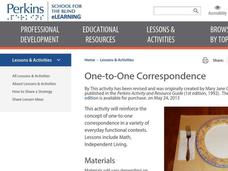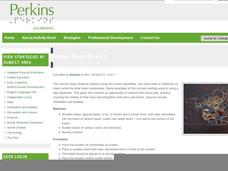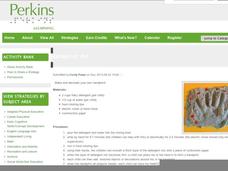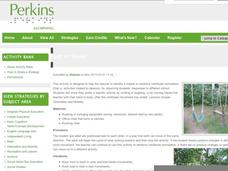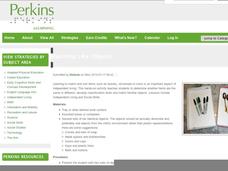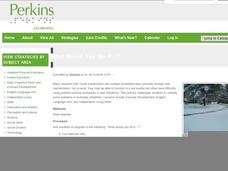Perkins School for the Blind
Eating Out
Going out to lunch, reading a menu, making choices, and spending time socializing are all parts of growing up. Teens with visual impairments use several braille menus from local restaurants to practice ordering and appropriatelyeating...
Perkins School for the Blind
One-to-One Correspondence
Here is an interesting way to build concept understanding regarding one-to-one correspondence. Learners with visual impairments will use an array of everyday objects in context to foster an understanding of what one-to-one correspondence...
Perkins School for the Blind
Rubber Band Stretch
If you don't teach blind or visually impaired students, this instructional activity may seem a bit strange. But, it helps them develop motor skills, orientation and movement skills, and listening skills, while building a better...
Perkins School for the Blind
Balance Stations
Children with visual impairments need to continuously work on balance, gross motor skills, and mobility. Foster mobility and orientation skills by engaging them in a series of fun balance stations during PE. You'll set up each...
Perkins School for the Blind
Handprint Art
Stimulate the senses with a handprint art project! Flake laundry detergent, water, and food coloring are mixed together to create a substance that has a pleasant smell and will dry hard and dimensional. Children with visual disabilities...
Perkins School for the Blind
Adapted Sorry Board Game
Board games are great for building social skills and for fostering recreation and leisure skills! Here, you'll find an image and a brief description of how you can make a tactile version of the game Sorry for your blind or...
Curated OER
Fast or Slow?
Vestibular stimulation is an action or activity relating to balance and motion. To find out what kind of vestibular stimulation your learners with multiple disabilities enjoy best, follow these simple suggestions. You engage the child in...
Illustrative Mathematics
Modeling with a Linear Function
Here is a well-designed resource that provides five yes-or-no questions which model different situations with linear functions. It makes a good pre-test for the beginning of the unit. The purpose is to elicit common misconceptions of...
Perkins School for the Blind
Building a Basic Series Circuit
Make science a fully accessible subject for your learners with visual impairments. They'll use tactile models to explore the nature of basic electrical circuits. Template board, wires, batteries, and Velcro are used to construct the...
Perkins School for the Blind
Conductors of Heat - Hot Spoons
Why is the end of a spoon hot when it's not all the way in the hot water? A great question deserves a great answer, and learners with visual impairments will use their auditory and tactile senses to get that answer. A talking...
Perkins School for the Blind
The Mystery Box - Making Observations and Collecting Data
Making observations and collecting qualitative and quantitative data is a vital skill all scientists need to practice. Help your scientists with partial and no sight learn how to use their other senses to make observations for...
Perkins School for the Blind
Modified Golf
Golf is a popular game that is enjoyed around the world. Invite your pupils with visual impairments or blindness to putt a few balls or make a hole in one. This lesson provides several very good suggestions as to how you can teach an...
Perkins School for the Blind
Modified Kickball
Kickball is a classic recess game that everybody should play at least once. Included here is a wonderful set of instructions that describe how you can modify the game to make it accessible to children with low or no visual ability....
Perkins School for the Blind
Rolling Along
I cannot stress enough how important orientation and mobility training is for learners with visual impairments. To practice maintaining their balance, as well as work on building the confidence to participate in recreational sports,...
Perkins School for the Blind
Capture the Treasure
Did you ever play capture the flag? I did, and it was so much fun! Your learners with special needs, physical handicaps, or visual impairments can play a classic and highly engaging game with a few minor adaptations. The best part is,...
Perkins School for the Blind
Figure Eight Walking
Walking in a straight line is one thing. Walking while trying to shift your weight from side to side to maintain balance is another challenge altogether. Learners with visual impairments practice walking in a figure eight. Cones are set...
Perkins School for the Blind
Beanbag Toss
Why is learning how to catch and toss so important? If one has visual impairments, learning this basic skill will help him increase orientation and mobility, coordination, and cognitive development,. Mastery of this skill will also mean...
Perkins School for the Blind
Modified Disc Golf
Here is a great set of adaptations and modifications that will make your next game of disc golf accessible to all your pupils. Listed are several variations and ways you can modify the game for your learners with physical or visual...
Perkins School for the Blind
Cooking and Kitchen Tools
Independent living skills and skills that can be used to gain employment are very important for any learner. Teens with visual impairments explore the kitchen to understand what everything is and what it all does. The instructional...
Perkins School for the Blind
Matching Like Objects
Same and different, sorting, and tactile discrimination are what's on the agenda for today. The class practices sorting objects and attempts to determine which objects are the same and different and why. The purpose is to increase...
Perkins School for the Blind
Packaging Snacks
Have your learners with special needs practice cooperative work skills, teamwork, and packaging. The kids will form an assembly line. Each pupil will add an item to a paper bag and then hand it off to the next person until the bag is...
Perkins School for the Blind
Bagging Groceries
Bagging groceries is a skill that can help learners with visual impairments understand organizing, problem solving, and weight discrimination. In addition, it is also a wonderful job skill. Help learners as they determine how to bag...
Perkins School for the Blind
Human Body Regulation
The human body can regulate itself through sweating and resting. Learners with visual impairments discuss how the body changes when it is under stress and what it does to regulate itself. To start, kids use talking thermometers to take...
Perkins School for the Blind
What Would You Do If...?
What would you do if...? That's a great question, and, when posed to learners with visual impairments, a question that can foster concept development and speaking and problem-solving skills that relate to real-life situations. The...
Other popular searches
- Gifted and Talented
- Gifted and Talented Math
- Gifted and Talented Education
- Gifted and Talented Lessons
- Gifted and Talented Reading
- Gifted and Talented Science
- Gifted Students
- Gifted Lessons
- Gifted and Talented Art
- Gifted and Talented Writing
- Gifted Literature Circle
- Gifted and Talented Students



